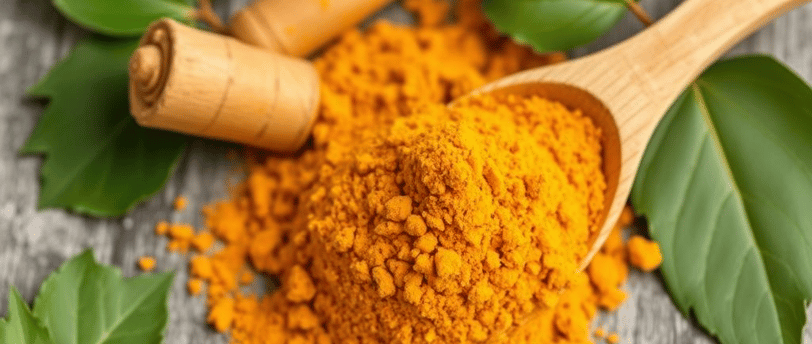Turmeric for Muscle Recovery: A Natural Anti-Inflammatory Remedy
FITNESS, MUSCLE RECOVERY & PERFORMANCE


In recent years, turmeric has garnered significant attention for its potential health benefits, particularly in the realm of muscle recovery. This vibrant yellow spice, commonly found in Asian cuisine, contains curcumin, a powerful compound recognized for its anti-inflammatory and antioxidant properties. This article delves into the forms available, common symptoms of muscle strain, the causes of muscle soreness, turmeric recipes, dosage guidelines, side effects, precautions, and scientific evidence supporting its use for muscle recovery.
Forms Available
Turmeric is available in various forms, allowing consumers to choose the most suitable option for their needs. Here are the most common forms:
Turmeric Powder: The most widely used form, turmeric powder can be easily incorporated into meals and drinks.
Turmeric Capsules/Tablets: These are popular for those seeking a concentrated dose of curcumin without the need to cook.
Turmeric Extract: This concentrated form often contains a higher percentage of curcumin, making it a potent option for those looking for specific health benefits.
Fresh Turmeric Root: Less common but increasingly popular, fresh turmeric can be used in cooking or as a juicing ingredient.
Turmeric Tea: This beverage combines turmeric with hot water and other ingredients, making it a soothing drink for recovery.
Common Symptoms of Muscle Strain
Muscle soreness can manifest in various forms, often leading to discomfort and reduced performance. Common symptoms of muscle strain include:
Pain or Tenderness: This may be localized to the affected muscle or spread to adjacent areas.
Swelling or Inflammation: The area around the injured muscle may become swollen due to increased blood flow and fluid accumulation.
Stiffness: Reduced flexibility and range of motion can occur as muscles tighten in response to injury.
Muscle Spasms: Involuntary contractions may happen as the muscle attempts to protect itself from further injury.
Understanding these symptoms is crucial for athletes and fitness enthusiasts aiming for effective recovery.
Causes of Muscle Soreness
Muscle soreness typically results from various factors, including:
Exercise: Particularly after unfamiliar or intense physical activities, muscle fibers undergo microtears, leading to soreness.
Injury: Overexertion or acute trauma can lead to strains or sprains.
Poor Warm-Up: Failing to properly warm up before exercise can lead to injuries and subsequent soreness.
Dehydration: Insufficient fluid intake can hinder recovery and exacerbate muscle soreness.
Nutritional Deficiencies: Inadequate intake of key nutrients, including proteins and antioxidants, may delay recovery.
Turmeric Recipes for Muscle Recovery
Incorporating turmeric into your diet can be both delicious and beneficial for muscle recovery. Here are a few easy recipes:
1. Turmeric Golden Milk
Ingredients:
1 cup of almond milk (or any milk of choice)
1 teaspoon turmeric powder
1/2 teaspoon black pepper (to enhance absorption)
1/2 teaspoon cinnamon
1 tablespoon honey (optional)
Instructions:
Heat the milk in a saucepan until warm.
Whisk in turmeric, black pepper, and cinnamon until well combined.
Sweeten with honey if desired and serve warm.
2. Turmeric Smoothie
Ingredients:
1 banana
1 cup spinach
1 teaspoon turmeric powder
1 tablespoon ginger (fresh or powdered)
1 cup coconut water
Instructions:
Combine all ingredients in a blender.
Blend until smooth and enjoy immediately for a refreshing post-workout drink.
3. Curried Lentils
Ingredients:
1 cup lentils
1 onion, chopped
2 cloves garlic, minced
1 tablespoon turmeric powder
1 can coconut milk
Salt and pepper to taste
Instructions:
In a pot, sauté onions and garlic until translucent.
Add lentils, turmeric, and coconut milk. Bring to a boil, then simmer until lentils are tender.
Season with salt and pepper. Serve hot.
Dosage
While there’s no universally accepted dosage for turmeric, studies suggest that a daily intake of 500-2000 mg of curcumin can be beneficial for muscle recovery. For powdered turmeric, a typical dosage is 1-3 teaspoons per day. However, always consult with a healthcare professional before starting any new supplement regimen, especially if you have underlying health conditions or are pregnant.
Side Effects and Precautions
Although turmeric is generally safe for most people, there are some potential side effects and precautions to consider:
Gastrointestinal Issues: Some may experience stomach upset or nausea, particularly at high doses.
**
